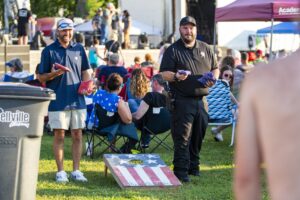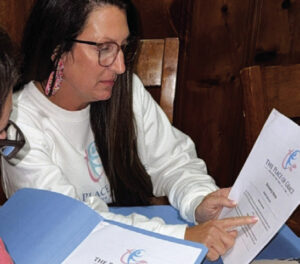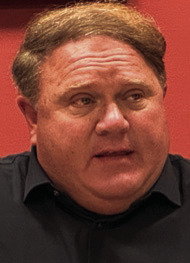Local attorney arrested by FBI
By Staff
Jason Houston FCT Managing Editor
Russellville attorney Ben Richey was arrested by FBI agents Monday morning just before 9 a.m. on the steps of the Franklin County Courthouse as he was preparing to begin jury selection for two trials this week in circuit court.
Richey, 47, a former district judge, was handcuffed and escorted by two agents to the federal courthouse in Huntsville. He is charged with one count of making a false statement to federal agents.
After appearing before U.S. Magistrate Judge Harwell Davis, Richey was released on his own recognizance on a $500 unsecured bond around noon Monday.
According to a press release from U.S. Attorney Alice Martin, Richey was indicted by a federal grand jury and accused of making a false statement to agents investigating former District Attorney John Pilati.
Pilati pleaded guilty to the same charge last May and is currently serving a six-month sentence in federal prison.
Richey is being represented by Birmingham attorneys Anthony Joseph and Walter Braswell, both former federal prosecutors.
In a lengthy press release Monday, Braswell objected to both the charge and the way Richey was apprehended by federal agents.
Braswell said he and Joseph were in consultation and negotiation with the U.S. Attorney's office as recently as last Friday attempting to reach a resolution of the matter, and at that time the government's attorney gave no indication that an arrest or any action was pending.
Martin said Richey is accused of falsely stating to the FBI that a payment made by one of his former clients to Pilati's office was unrelated to the settlement of the client's criminal case.
Braswell said Richey was the defense attorney for an individual charged with a drug offense. He said prior to Richey being contacted about the case, Pilati and the individual's father reached a plea agreement, with money forfeited by the defendant to a state fund controlled by the D.A.'s office. He said the money was the cost of a car used in drug transactions which had already been sold before the plea agreement.
Braswell said Richey agreed to handle the plea agreement and regarded the settlement as a normal "plea bargain."
Braswell said Circuit Judge Sharon Hester had objected to the District Attorney accepting payments into the state fund controlled by his office. Because these payments were handled administratively rather than as part of a court proceeding, no mention of this part of the settlement was made in court when the plea was to be entered, Braswell said.
Hester did not accept the plea at that time, according to Braswell, but later a plea of guilty on precisely the same terms offered by Pilati was accepted by another judge.
Braswell said federal and state agents investigating Pilati questioned Richey regarding his handling of the guilty plea and whether the forfeiture of money was a "requirement" for getting the charge against his client reduced. Richey told the agents that he regarded it as a standard plea bargain and that he was not aware of any quid pro quo. He said he viewed the settlement offer as a package deal which the client could take or leave, but did not attach crucial importance to the payment of money as a separate part of the agreement.
Braswell said in subsequent interviews, federal agents insisted to Richey that the payment in question was "essential" to his client's agreement.
Braswell said Richey again stated he was not aware of any improper conduct by Pilati. After making a full written statement to the government, Braswell said federal prosecutors demanded that Richey agree to testify against Pilati and plead guilty himself to a violation, promising him probation if he would do so. Richey refused, Braswell said.
Braswell said it should be noted that federal and state prosecutors are allowed to seize property used in crimes or purchased with the proceeds of crimes, even when no criminal charges are ever filed against an individual.
Richey, a Phi Beta Kappa graduate of The University of Alabama, who earned his law degree at Boston College, is a life-long resident of Russellville. Married with three children, Richey has practiced law in Franklin County since 1980 and served as district judge from 1988 until 1992.
Richey is presently a commissioner of the Alabama State Bar and is active in both his church and Boy Scouts.
Richey will be arraigned Thursday at 9:30 a.m. in the Birmingham federal courthouse.













